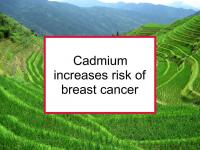Cadmium is a toxic heavy metal with no beneficial effects on health. Cadmium accumulates in tissues since the body does not readily eliminate it. Cadmium functions as an endocrine disruptor, stimulating estrogen receptor (ER) activity and promoting uterine and mammary gland growth in mice.
Numerous studies have demonstrated that cadmium promotes the growth and proliferation of breast cancer cells. High cadmium levels in breast tissue and urine have been linked to increased rates of breast cancer, but available studies are somewhat inconsistent. Now a new study has reported a dose-dependent relationship between urinary cadmium levels and breast cancer risk in Japanese women, a population that can accumulate significant cadmium levels through consumption of rice and seafood.
Latest research finds link between urinary cadmium and BC
The case-control study referenced at the beginning of this news article was designed to investigate the association between urinary cadmium levels and breast cancer risk among Japanese women. The study included 153 women newly diagnosed with breast cancer and 431 cancer-free women (controls) who were matched according to menopausal status, age, and the time period of urine sampling.
Urine samples were collected from the breast cancer patients after breast cancer surgery but before any other cancer treatment. A self-administered questionnaire was used to collect information on breast cancer risk factors. Study participants were divided into three groups (low, medium, high) depending on their creatinine-adjusted cadmium levels.
Study results
Women with the highest cadmium levels (> 2.620 ìg/g) were found to have more than six times the risk of breast cancer compared to those with the lowest levels (< 1.674 ìg/g) after controlling for breast cancer risk factors. The risk of breast cancer increased with increasing levels of urinary cadmium (a statistically significant trend).
The authors conclude that the study results suggest exposure to cadmium is associated with breast cancer risk in Japanese women.
Please see our article on cadmium and breast cancer for more information.
